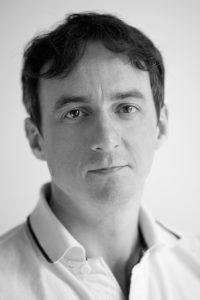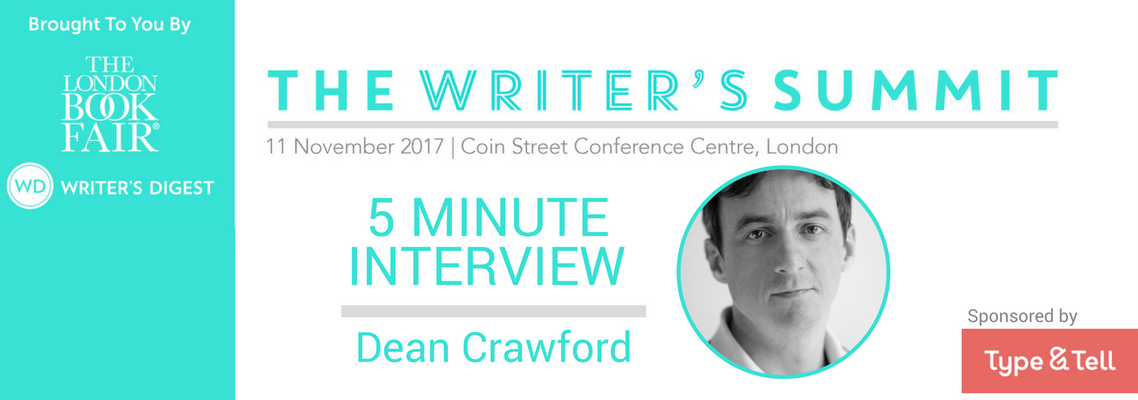 Dean Crawford began writing after his dream of becoming a fighter pilot in the Royal Air Force was curtailed when he failed their stringent sight tests. He spent the next fifteen years writing novels in the pursuit of a career as a fiction author, finally being signed to literary agent Luigi Bonomi’s LBA Books, London, in May 2010. The subsequent deals for his books allowed Dean to become a full-time author in the September of that year, and he has been writing for a living ever since.
Dean Crawford began writing after his dream of becoming a fighter pilot in the Royal Air Force was curtailed when he failed their stringent sight tests. He spent the next fifteen years writing novels in the pursuit of a career as a fiction author, finally being signed to literary agent Luigi Bonomi’s LBA Books, London, in May 2010. The subsequent deals for his books allowed Dean to become a full-time author in the September of that year, and he has been writing for a living ever since.
His traditionally published novels have regularly featured on the Sunday Times paperback bestseller list and have sold all over the world. Dean also ventured into independent publishing in 2013, selecting titles from his work that were not sold to traditional houses, and has since built a backlist of twenty independent novels under his Fictum label. These titles have sold well over 100,000 copies alone, making him one of the more successful independent authors in the UK.
Dean now focuses his time equally between his traditionally and independently published works, directing each title to where he feels the market is strongest.
1.What was the last book you read? Harry Potter & the Philosopher’s Stone, twenty years after it was first published. I hadn’t even seen any of the movies. It’s amazing how having a six-year old daughter can change your reading habits…
2.What’s next on your reading list? Nothing. I’m so busy writing that I find myself with little time to read, but I’m keen to pick up Dan Brown’s latest, Origin, to see what he’s done there.
3. When did you first realize you wanted to be a writer? I was nineteen years old and reading a Wilbur Smith novel and it crossed my mind that I could possibly achieve something similar. I’d just learned that I could never fly for a living due to being very slightly colour blind, so I was looking for another goal. Writing was something that was inside of me, rather than outside, and so I could start right away. I was amazed at the time that I hadn’t thought of trying it before.
4. What advice would you give to aspiring writers? Never quit. The best novel in the world probably hasn’t been published yet because most of those trying to get published never get there, or grow disheartened and abandon the attempt or never actually finish the novel in the first place. Read voraciously in your favourite genre and write in the same one – it’s what you love so stick to it. Be commercial and consider digital independent publishing if agents and publishing houses aren’t playing ball. Indie publishing is not a second-best alternative but a viable career move and many thousands of indie authors are quitting day jobs to write full time while so many trad’ published authors are back in day jobs because they can’t make ends meet. Go for what works best in terms of markets and your needs – if your genre is selling well digitally but not on the high street, you should probably go indie. If the reverse is true, hit some agents with submissions and see what pops up. It’s not easy whichever side of the fence you go, but hard work is often rewarded with good results. I’ve said it many times over the years so I’ll say it again – the most successful people out there aren’t necessarily the best at what they do – they’re simply the ones who didn’t quit when the going got tough.
5. Which great novel have you tried to read but failed? Chaucer’s The Canterbury Tales, at school. I don’t read “great novels” just because it’s considered fashionable to have done so. I know what I like and have no desire to drag myself through anything like that ever again.
6. Tell us about a passion you have outside the business. Aviation and virtual reality. I trained for my pilot’s license in 2015 and thoroughly enjoyed it, but even there my colour blindness got in the way and I left real-world aviation for good in 2016. Now, VR allows me to finally see the world of a fighter pilot with tremendous realism while sipping coffee. The revolution of VR isn’t yet in full swing but it’s coming and is extremely exciting. I have a demo that comes with the Rift where you confront a six-ton Tyrannosaur – believe me, friends who have tried it have literally screamed! Great fun 🙂
7. What are the most common traps for aspiring writers? Copying the current big bestsellers, which never works as agents and publishers only follow a trend for short periods whereas it can take two years to bring a book to market, by which time the trend has likely faded. Telling not showing, not following agents’ advice on submission processes, not following publisher’s advice on editing, thinking that all publishing deals are for hundreds of thousands of pounds, thinking that writing is an easy career path, thinking that they’ll only have to write one book per year. Many new authors think that their first work is brilliant – it most usually isn’t. Editing and re-drafting are hugely important. I spent three days drafting my letter to literary agents. I spent a year editing my first successful novel ( Covenant ) before any agent ever saw it.
7. If you could tell your younger self one piece of advice, what would it be? Write sooner, and buy some good books on the art of writing fiction. It would have saved me five years or more of learning.
8. Have you based any of your characters on real people? Yes, and no I won’t say whom. Often it’s because it helps to bring characters to life though, rather than gaining revenge on someone you don’t like by having them die horribly in your novel.
9. How do you select the names for your characters? Internet searches mostly, although I often like to hide character traits in names via synonyms, in the manner of Cruella Deville and others.
10. What was your favourite childhood book? The Willard Price novels, and also Star Wars, which was novelised and was actually a really good book. I read them all countless times.

